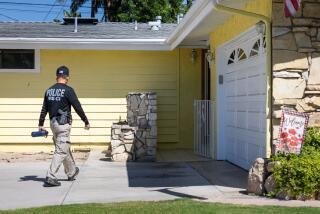San Diego DA investigating at least $5 million in suspected unemployment fraud by local inmates
- Share via
SAN DIEGO — The San Diego County district attorney is investigating inmates in local jails and state prison for possibly committing as much as $5 million in unemployment benefits fraud, part of an emerging statewide scandal of widespread fraud by prisoners totaling at least $400 million.
In a statement, Public Affairs Officer Tanya Sierra said the agency is in the “very early stages” of investigation into the benefits program administered by the state Employment Development Department.
“While the complete scope of the fraud is not clear at this time, early indications are that as much as $5 million in fraudulent payments were made to inmates at the RJ Donovan Correctional Institution alone,” she wrote in the statement Friday, referring to the state prison in Otay Mesa.
News of the probe comes just days after state officials revealed $400 million in unemployment benefit claims were wrongly paid to state prison inmates, including more than 100 condemned prisoners on death row.
On Thursday San Diego County Dist. Atty. Summer Stephan signed on to a letter, along with eight other district attorneys, to Gov. Gavin Newsom, contending that as much as $1 billion in payments may have been sent out of state — and that the total fraud from the scam might grow even larger.
Locally investigators from the DA’s office are working with the San Diego County Sheriff’s Department, the state prison system and EDD to uncover how much fraud has occurred at Donovan and the county jails, and “identify suspects and determine what evidence exists that can be proven beyond a reasonable doubt and lead to appropriate criminal charges,” Sierra said.
She could not say how many inmates may have been involved. Stephan said that it will also take time to unravel the extent of the scheme.
“It’s outrageous that taxpayers will be on the hook for these fraudulent payments and that a system was not in place earlier to alert authorities and prevent such fraud,” Stephan said. “A forensic investigation will take time and resources but is necessary to hold individuals responsible for gaming the system at a time when our economy and our communities are already hurting amid the ongoing pandemic.”
In the letter Stephan and her colleagues wrote they had received “unverified information that EDD has distributed at least $1 billion to out-of-state claimants.”
The letter called on Newsom to give the district attorneys emergency funds to investigate and prosecute the fraud, and have state agencies join forces with an existing federal task force and a statewide task force of local DAs that have been investigating for months.
It also asked for an order allowing the cross-matching of inmate data such as Social Security numbers, names and birthdays with EDD claims, to sort out bogus payments. They urged Newsom to use his sweeping power under the state Emergency Services Act, which gives the governor broad authority during a state of emergency and which was invoked at the start of the pandemic in March, to order that cross-matching.
“There is perhaps no greater need to protect the resources of the state than to immediately prohibit payment of unemployment benefit claims made in the names of state, federal and local inmates,” the prosecutors wrote. “Furthermore, there is critical and urgent need to provide financial assistance to those legally entitled to these benefits.
“With the significant backlog of EDD claims pending, immediately implementing a cross-match system will expedite and assist in aiding the payment of legitimate claims to those in urgent need of financial assistance.”
The letter said there is a belief among state agencies that state laws and regulations prohibit the sharing of these data among each other. The letter stated that is incorrect, but noted that if there are any limitations to sharing the data they can be swept aside via an executive order under the emergency powers law.
Without action now the district attorneys said they were concerned the fraud could grow “exponentially.”
The allegation that funds have been sent out of state comes at a time when the EDD is under intense criticism for not issuing payments to hundreds of thousands of state residents with valid claims stemming from the economic devastation caused by the COVID-19 pandemic and resulting shutdowns.
The fact that an out-of-state payment has been issued is not evidence it is fraudulent, since some residents may have lost their job, made a claim and since moved out of state temporarily. Prosecutors say the cross-matching will allow them to begin to separate out legitimate claims from bogus ones.
Some prosecutors who have been investigating the scheme said it might be the biggest taxpayer fraud in state history. The depth and breadth is not known yet, but some counties have said how many inmates they suspect could be involved.
In Amador County, the district attorney there told the Los Angeles Times some 500 inmates at Mule Creek State prison may have accounted for up to $2 million in claims. Riverside County Dist. Atty. Michael Hestrin said some 1,500 inmates there could be involved and his office is still unraveling the extent. In Lassen County, Dist. Atty. Susan Melyssah Rios told The Times that 900 inmates at Mule Creek State Prison are implicated in $4 million in fraud, so far.
Moran writes for the San Diego Union-Tribune.
More to Read
Sign up for Essential California
The most important California stories and recommendations in your inbox every morning.
You may occasionally receive promotional content from the Los Angeles Times.










